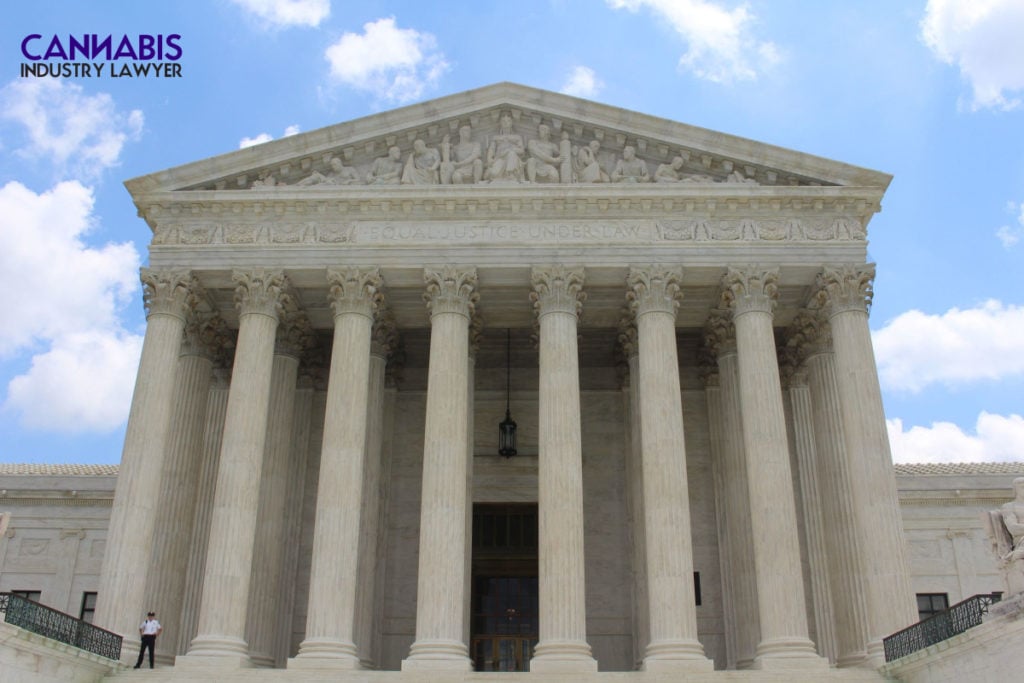On Monday, June 28th, 2021, a surprising proponent to end the federal prohibition of marijuana emerged in the US Supreme Court.
After the Court denied a review of a Colorado case which dealt with a medical marijuana dispensary and a challenge to a public policy provision in the Tax Code, Associate Justice Thomas, wrote a statement acknowledging that, because of an acceptance of state-level cannabis legalization, “a prohibition on intrastate use or cultivation of marijuana may no longer be necessary or proper to support the Federal Government’s piecemeal approach.”
He further asserted that the Colorado case that the Supreme Court refused to hear is a prime example of the fact that marijuana businesses do not experience “equal treatment” under the law.
For nearly two decades now, the US Supreme Court has maintained its decision from Gonzales v. Raich (2004), which based its usage of the commerce clause on the storied wheat farmer featured in Wickard v. Filburn (1941).
Under the Raich decision, the Court ruled that Congress’ power to regulate interstate commerce authorized it “to prohibit the local cultivation and use of marijuana.”
The Court’s reasoning was that Congress had “enacted comprehensive legislation to regulate the interstate market in a fungible commodity” and that exemption for local use could undermine this “comprehensive” regime.
The Court stressed that Congress had decided “to prohibit entirely the possession or use of marijuana” and had “designate[d] marijuana as contraband for any purpose, prohibiting any intrastate use was thus, according to the Court, “‘necessary and proper’” to avoid a “gaping hole” in Congress’ closed regulatory system.”
However, in his statement, Justice Thomas acknowledged that since the decision was made in Raich, which was meant to solidify the federal government’s approach on cannabis, Congress has sent mixed signals on enforcing its once comprehensive views.
For example, between 2009 and 2013, the Department of Justice issued memorandums outlining a policy against intruding on state legalization schemes or prosecuting certain individuals who comply with state law. Additionally, in every fiscal year since 2015, Congress has prohibited the Department of Justice from “spending funds to prevent states’ implementation of their own medical marijuana laws.”
These policies by Congress and the federal government have had significant ramifications, given the vast expansion of US states developing marijuana laws since the decision in Raich. Indeed, in just the last year, New York, New Mexico, Virginia, New Jersey and Connecticut have all passed adult-use recreational marijuana laws.
Currently, there are 36 states with medical marijuana laws, and 18 of them, and also Washington D.C., have recreational use laws enacted as well. South Dakota passed a referendum to legalize marijuana in its state, which would have made it the 19th state to pass such a law, but currently the bill was overturned in the courts. Support for complete legalization of cannabis is at 68% nationwide.
“One can certainly understand why an ordinary person might think that the Federal Government has retreated from its once-absolute ban on marijuana.” – Justice Clarence Thomas
Behind the statement
Justice Thomas’ statement summed up the incongruity of the federal government when he said that, “the Federal Government’s current approach is a half-in, half-out regime that simultaneously tolerates and forbids local use of marijuana. This contradictory and unstable state of affairs strains basic principles of federalism and conceals traps for the unwary.”
The Justice is acknowledging the fact that, since the decision in Raich, no Attorney General or sitting President has been strong enough to reclassify cannabis to allow use in states that have passed legalization laws, and in turn would address other significant problems with the current federal laws regarding marijuana, especially the tax code.
For the US marijuana industry, and for the country as a whole, this statement by a sitting US Supreme Court Justice questioning whether or not the Federal marijuana laws are even necessary is a promising argument that gives hope to millions that the end of marijuana prohibition is in sight.
However, given that not one of the other Justices added their name with Justice Thomas’s statement, it seems it still will be a long journey for the judicial system to help end the criminalization of marijuana.
Don’t forget to check out our Marijuana Legalization Map where you can browse the current status of laws in every state in the United States and see all our posts on each of them.





